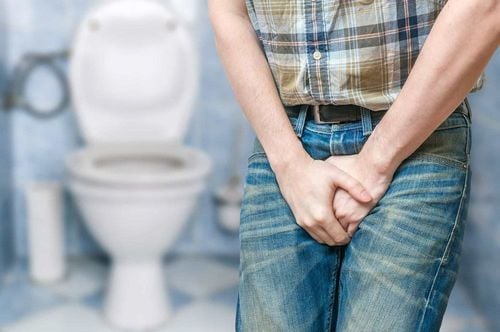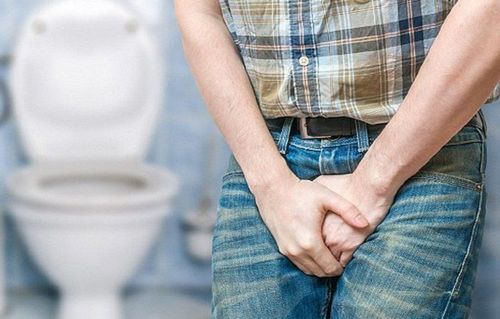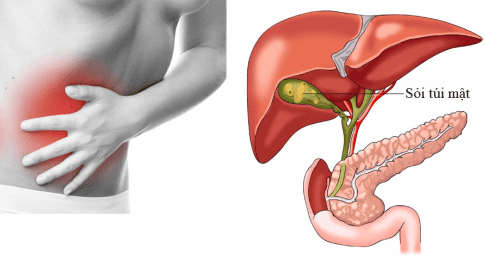This is an automatically translated article.
Patients with kidney disease often experience back pain. However, it is difficult to tell the difference between kidney pain and back pain caused by other conditions. Back pain from kidney disease can occur on one or both sides of the back just below the rib cage.
1. Pain due to kidney disease
Kidneys filter waste and toxins from the blood, so they are more susceptible to infection and damage than other organs. Excess calcium, oxalate, and phosphorus can build up in the kidneys to form kidney stones, which can be painful if they cause a blockage.
The kidneys are located next to the lumbar spine at the bottom of the ribs. A normal person will have 2 kidneys located symmetrically on either side of the lumbar spine, the left kidney will be located about 2cm higher than the right kidney.
Kidney pain occurs below the rib cage on either side of a person's spine. Many people may also feel as if the pain is coming from deep within the body. People may feel pain on one or both sides of the body depending on whether a condition affects only one kidney or both.
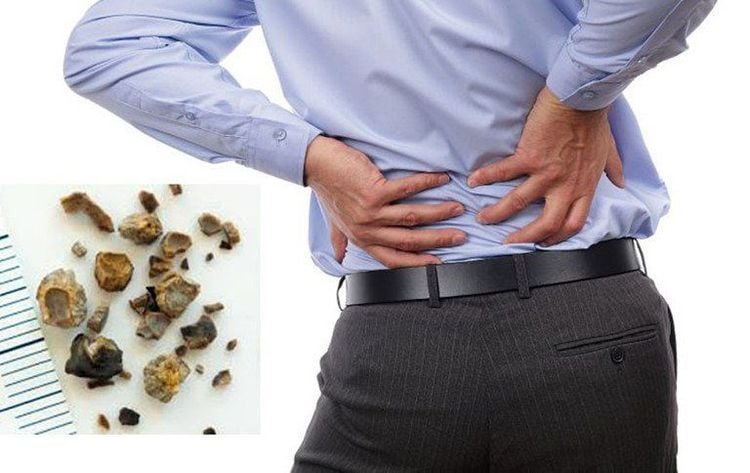
Tắc nghẽn sỏi thận là thể gây đau gần cột sống thắt lưng
2. Distinguishing common back pain and back pain caused by kidney disease
2.1 Back pain due to kidney disease Kidney disease can cause pain sensation in the upper back. Pain from the muscles or spine occurs when bending over or lifting an object, and can be felt in the middle of the back or on the sides of the back.
The most common causes of kidney pain in the back are:
Infection: An infection in the kidney is called acute pyelonephritis. Kidney stones: Stones can cause a very severe pain that is accompanied by spasms, and pain that radiates down the groin, also known as renal colic. Other symptoms of kidney disease to watch out for besides back pain are: Painful urination, frequent urination, frequent urination, strange colored urine, change in taste, loss of appetite, dizziness, headache, fever, apple constipation, diarrhea, metallic taste in mouth, fatigue, itching or rash.
Signs of serious kidney damage or problems may include:
Bad breath Metallic taste Short breath Swelling of legs, ankles or feet Confusion Irregular heartbeat Cramps
Recommended videos : What to eat and what to avoid with kidney stones?
2.2 Common back pain Back pain is often caused by problems affecting the muscles, bones, or nerves in the back. The location, severity, and accompanying symptoms of back pain vary depending on the cause. Back pain can occur anywhere in the back. However, most people experience pain in the lower back.
Back pain caused by muscle pain feels like a dull ache or aching. Certain body movements can trigger or aggravate muscle pain, which can range in intensity from mild to severe. People with sciatic nerve back pain may experience a burning or stabbing sensation in other areas of the body. Sciatica is a type of nerve pain that affects the back. Patients have sciatica when the sciatic nerve is compressed causing a burning pain in the lower back that radiates through the buttocks. Bone pain can be caused by a vertebral fracture or an irregularly shaped spine. This kind of pain comes unexpectedly. Bone pain ranges from moderate to severe and often worsens with movement. Other symptoms that may accompany back pain include:
Pain or stiffness along the spine Sharp pain in the neck The patient finds it difficult to stand upright due to pain or muscle spasms Difficulty walking Numbness or tingling in back spreading to extremities Weakness in one or both legs
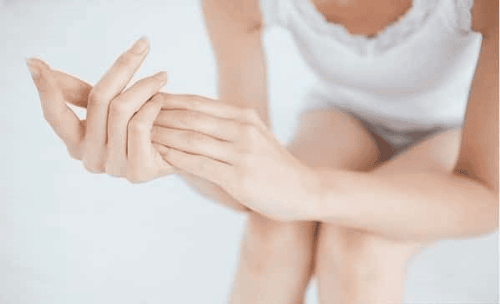
Đau lưng có thể kèm theo tê ngứa lan ra tứ chi
Causes of back pain include:
Muscle or ligament strain in the back is a common cause of back pain. Back pain can be caused by overstretched muscles, by the patient lifting heavy objects, or by using incorrect lifting techniques. Improper sitting posture Standing or sitting for long periods of time Muscle spasms Back injury, such as a broken bone or a fall Disc Damaged, dislocated or broken Scoliosis Tumor A person Mild back pain can often be treated at home with rest, massage, and over-the-counter pain relievers. However, people should see a doctor if back pain is severe or pain is caused by an injury.
Please dial HOTLINE for more information or register for an appointment HERE. Download MyVinmec app to make appointments faster and to manage your bookings easily.
MORE:
Why do kidney stones cause back pain? What are the complications of renal colic? Identify the pain caused by urinary stones





